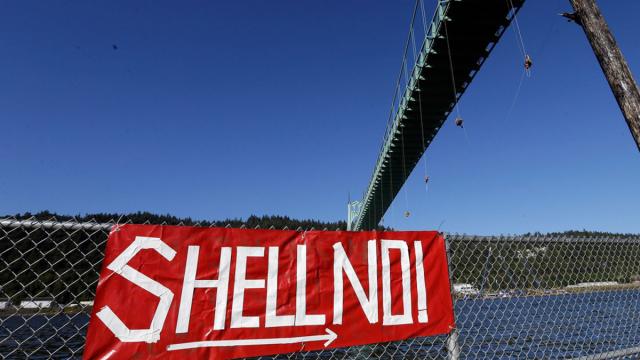
Shell’s decision to put its Arctic oil exploration plans in deep freeze will have several knock-on effects for global oil exploration, environmental protests and the future of the company itself.
The broader Arctic retreat by energy firms once bullish about polar prospects has now left just two working operations in the region: BP’s Prudhoe Bay field, which feeds the Trans-Alaskan pipeline, and Gazprom’s largely symbolic Prirazlomnoye platform in the Pechora Sea.
Publicly, Shell blames disappointing exploratory results, high operating costs and strict U.S. environmental regulations for its decision to quit Alaska’s Berger field after about $7 billion (£4.6 billion) of investment. But company sources also accept that Arctic oil polarized debate in a way that damaged the firm. “We were acutely aware of the reputational element to this program,” one said.
The notion of drilling in some of the world’s most pristine and hazardous regions – which, in the case of the Arctic, was only made accessible by retreating ice cover due to climate change – has also become politically toxic, Greenpeace says.
“It is undeniable that the protests were a factor in Shell’s decision because the Arctic had become a defining environmental story,” Ben Ayliffe, a Greenpeace Arctic campaigner told the Guardian. “A burgeoning and increasingly vocal movement sprung up across the world. The prospects for Arctic oil were never far from the public spotlight and they began to look increasingly toxic.”
Ayliffe added that a strong climate deal was needed at the UN climate summit in Paris later this year to consolidate the current Arctic pull-out. “It is imperative that this victory becomes a long term one for the Arctic itself,” he said.
After a series of high profile environmental demonstrations, Hilary Clinton tweeted out against Shell’s plans to drill in Alaska’s Chuckchi Sea last month.
The issue also forced Shell out of the Prince of Wales’ corporate leaders group on climate change, which it had helped to form, and prompted a rebuke from the head of the International Energy Agency.
Shell officials argue that, despite today’s low oil prices, rising energy demand from a growing world population will continue to oblige new oil field discoveries, to arrest annual decline rates of about 5m barrels of oil per day.
The energy giant hopes to receive regulatory clearance for its proposed $64 billion buyout of gas group BG early next year.
“One of the key strategic drivers for that deal is bringing together BG’s deep water portfolio in Brazil with ours,” said Andy Norman, Shell’s VP for media relations. “We also have some attractive acreage in the Gulf of Mexico. But much of our focus now is on completing that [BG] deal and we will reduce exploration spending on the back of that, assuming it completes.”
If this happens, Greenpeace says that the pre-salts oil fields off the coast of Brazil will be the next arena for global protests against environmentally hazardous drills.
“Greenpeace and other NGOs have worked there in the past and I’m sure they will follow Shell,” Ayliffe said. “We have seen from the deepwater Horizon oil spill in the Gulf of Mexico that deepwater drills in Brazil are not without risk.”
They may also carry a risk for company boardrooms. Shell was told by investors to test the firm’s business models against international goals to limit climate change at its last AGM.
Shell’s dirty energy projects in the Arctic and in Alberta’s tar sands have already tarnished a green image that it carefully crafted over several years. The firm has set a $40 a tonne internal price on carbon, and lobbied for higher EU carbon prices to fund the development of its carbon capture and storage technologies.
The Dutch company now produces more gas than oil and was one of the best performing fossil fuels firms in a recent climate performance survey of top corporations. Researchers say that its rating would have been much higher without Arctic oil.
In the past, Shell has largely turned its nose up at wind or solar-powered projects, in favour of first-generation ethanol-based biofuels in Brazil, which have a disputed emissions-reducing potential. But this too could change.
“After 2050, we think that solar will be single most dominant energy source in the global energy system and we are working hard to understand where we can play a role in that transition and where opportunities might exist for us,” Norman said.
In the short-medium term though, the company insists that it is not blanching from its mission to meet current energy demand with hydrocarbons.
3 WAYS TO SHOW YOUR SUPPORT
- Log in to post comments











